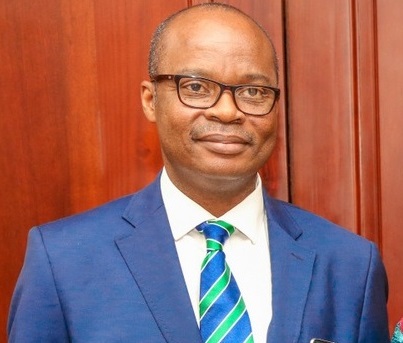
Ghana doesn’t need deposit protection scheme - former BoG governor
Maxwell Akalaare Adombila
Business News
A former Deputy Governor of the Bank of Ghana (BoG), Mr Emmanuel Asiedu-Mante, has stoked debate on the relevance of a deposit protection (DP) scheme in the country, describing it as an “unnecessary burden” to banks and depositors that can keep interest rates at neck levels.
With public confidence in banks at appreciable levels and bank deposits still on the rise, Mr Asiedu-Mante said there was no need introducing DP that would require banks to insure a portion of customer’s deposits with the yet-to-be established Ghana Deposit protection Corporation (GDPC).
Doing that, he said, would amount to raising the cost of banking, which would then be passed on to customers through increased interest rates.
As a result, the former deputy governor has advised the central bank to reconsider its decision to roll out a DP scheme, ostensibly to inspire confidence and protect depositors against rainy days.
Already, Mr Asiedu-Mante told the GRAPHIC BUSINESS on January 30 that he had registered his resentment on DP to the BoG with the hope that it would reconsider its stance.
Breakfast meeting
Mr Asiedu-Mante, who retired from BoG in 2006, was speaking to the paper ahead of the first edition of this year’s GRAPHIC BUSINESS/Stanbic Bank Breakfast Meeting on DP.
Scheduled for February 6 at the plush Labadi Beach Hotel in Accra, the meeting will afford players in the banking space the opportunity to deliberate on the pros and cons of deposit insurance, which is now mandatory following the passage of the Ghana Deposit Protection Act, 2016, Act 931, two years ago. It will also provide the platform for the central bank to update the country and the banking fraternity, the state of affairs of the DP scheme.
It will be on the theme ‘Deposit insurance, catalyst for a stronger banking sector’ and will have Governor of the BoG, Dr Ernest Addison, as guest of honour.
The American philosophy
Deposit protection is an insurance provided by the state against the risk of loss of deposits in a deposit-taking institution.
Although the practice is pronounced in most countries, including Nigeria, it is yet to be introduced here. Previous attempts to introduce it have stalled, with the recent being 2014.
The latest attempt, which is the most convincing, has the backing of the International Monetary Fund (IMF), which is helping the country to stabilise the economy with a four-year fiscal consolidation programme.
Sharing his views on DP ahead of the February meeting, Mr Asiedu-Mante said conditions that warranted the operation of DI schemes in other countries were absent in Ghana, hence the need to reconsider the project.
Tracing the circumstances that led to the establishment of DP schemes, he indicated that following the banking crisis in the United States of America in the 1930s, confidence in banks plummeted to record levels, prompting regulators at the time to innovate ways to reverse the trend.
One of those, he said, was the introduction of a DP scheme to inspire people to save.
One of those, he said, was the introduction of a DP scheme to inspire people to save.
“This is philosophy behind deposit insurance in America. Now, the same conditions do not prevail over here. Here, if you watch BoG data, you will realise that anytime the bank’s deposits are going up, deposit liabilities of the banks also go up.”
“This is because there is still a large chuck of unbanked people and all of them are being roped into the banking sector. So the question of confidence in banks does not exist here,” he said.
Cost of DP
Beyond that Mr Asiedu-Mante said DP schemes also came at a premium that would “surely” be passed on to customers through increased interest rates.
With bank rates already high – above 30 per cent – leading to agitations by private sector, the former deputy governor said introducing DP “will worsen an already bad situation.”
“If you saddle the banks with an additional premium by way of an insurance premium, they are going to pass it on to customers by way of high lending rates.
“So this argument of DP being done in Malaysia, Britain and USA does not add up. Let’s ask ourselves; what are the lending rates there? They are small and so they can afford to do this. In our case, it will not augur well because you will then be worsening an already bad situation,” he said.
Curative approach
Mr Asiedu-Mante further described DP schemes as curative approaches that should not be entertained by BoG.
Instead, he said the BoG and the country in general, should adopt a preventive approach to protect customers.
“DP is a curative approach to solving the problem. Curative in the sense that you wait until a bank has crisis and then you assemble all machinery to resolve all the crises that the bank finds itself in. That way, you are curing the problem,” he explained on the January 30 interview.
“Now, I believe that the preventive is better. By preventive approach, I mean strengthening the supervision department of the central bank so that they will mount surveillance on the banks such that they will not even run into problems in the first place. I prefer this to the curative one, where the damage gets done and you now have to rely on the insurance,” he said.
On whether DP was not an added advantage to the banking sector, Mr Asiedu-Mante asked, “At what cost?
“If your lending rates are already 35 per cent and the private sector is complaining, should you still go ahead and introduce a scheme that will worsen that situation? For me, the negative side is far heavier than the positive side,” he added.